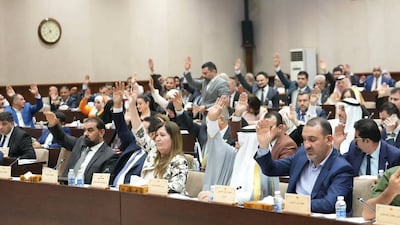Iraq's parliament endorsed at dawn Monday the largest budget in the country’s history after months of political wrangling and four days of voting on individual articles.
The budget stands at 198.91 trillion Iraqi dinars ($153 billion) and runs with a deficit of 64.36 trillion dinars. Supporters of the budget said it will expand Iraq's social safety net, including state food rations, while allocating significant spending for critical infrastructure.
Representatives of the Ministry of Electricity, for example, said last month it would represent a “quantum leap” for the troubled sector, where power cuts are frequent.
But analysts said far too much money will be spent on salaries, including allocations for hundreds of thousands of new jobs. They said Iraq will not be able to afford this spending outlay if oil prices fall below $70.
The operational expenditure stands at 133.22 trillion dinars (about $102.5 billion) while investment expenditure will be 49.35 trillion dinars ($37.9 billion). The remainder of expenditure will mainly go to debt servicing.
It is based on an assumed average oil price over three years of $70 a barrel, with an average daily crude oil output of 3.5 million barrels, including 400,000 from the Kurdistan region.
The government of Prime Minister Mohammed Shia Al Sudani is planning to repeat it next year and in 2025, although parliament will be able to vote on amendments. Iraq’s fiscal year usually starts on January 1.
Iraq is Opec's second-largest oil producer and oil revenues make up nearly 95 per cent of federal budget. As of early last month, the country's foreign reserves stood at $111bn, the highest since the 2003 US-led invasion that toppled Saddam Hussein, according to the Central Bank of Iraq.
It has also boosted its gold reserves to 132.74 tonnes, maintaining its rank at 30 among the world's gold-holding nations, CBI said.
Kurdistan Region
For the first time, the budget has strengthened the federal government hands on Kurdistan region's oil industry, one of the thorny issues emerged after the US-led invasion that toppled Saddam Hussein.
The KRG had said Iraq's 2005 constitution gave it the right to sign agreements with oil companies and states without consulting Baghdad.
But Baghdad maintained the region had no right to sign deals and said exports had to go through state-run pipelines and be marketed by the federal government's State Organisation for Marketing of Oil.
In February last year, Iraq’s Federal Supreme Court ruled that Kurdish region's law regulating its oil and gas industry was unconstitutional. The court demanded the region hand over all this industry’s activities to Baghdad.
However, the Kurdistan Judicial Council refused and said: "the actions of the Kurdistan Regional Government in relation to oil and gas operations are in accordance with the Iraqi constitution of 2005”.
In March, Baghdad won an arbitration case against Turkey for allowing the Kurdistan region to export oil without Baghdad's consent.
The ruling by the International Chamber of Commerce in Paris stopped about 450,000 barrels per day from being exported from the Kurdistan region and oilfields in northern Kirkuk.
In April, Baghdad and Erbil reached a deal, allowing Baghdad to market oil produced in the Kurdish region and to sign the deals with companies. The oil exports have been resumed yet.
That deal has been pinned down in the budget.
It stipulates that Kurdistan hand over 400,000 barrels per day to SOMO. Oil revenues will be deposited in one bank account and will be overseen by Baghdad but will be under the control of the KRG.
The Federal Board for Supreme Audit of Iraq will have access to audit the account in co-operation with the Federal Oil Ministry and Kurdistan’s Ministry of Oil and Natural Resources and Audit Board. An international auditing company will be hired.
The budget also has deepened the rift between the Kurds mainly the Kurdistan Democratic Party, which controls the government, and the Patriotic Union of Kurdistan, which dominates Sulaymaniyah province.
PUK pushed for an article that gives governorates the right to ask Baghdad for a separate budget if they feel that the Kurdistan Regional Government is not giving them a fair share of funding.
The PUK has long accused the KDP of using its control of the Kurdistan region’s oil industry to deny Sulaymaniyah governorate, its fair share of funding.
The KDP says that article is unconstitutional and will appeal to the Federal Court.


